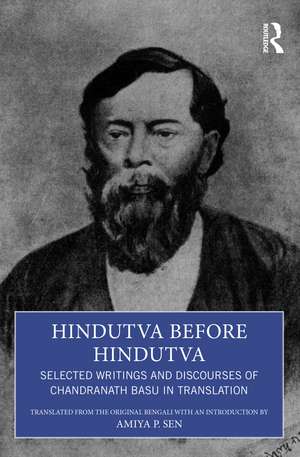Hindutva before Hindutva: Selected Writings and Discourses of Chandranath Basu in Translation
Editat de Amiya P. Senen Limba Engleză Paperback – 20 aug 2024
A unique contribution, this book will be an essential read for scholars and researchers of religion studies, history, postcolonialism, literature, Indian political thought, Indian history, political science, Hindu studies, Hindusim, sociology and political ideology, and South Asian studies.
| Toate formatele și edițiile | Preț | Express |
|---|---|---|
| Paperback (1) | 311.33 lei 3-5 săpt. | +22.31 lei 6-12 zile |
| Taylor & Francis – 20 aug 2024 | 311.33 lei 3-5 săpt. | +22.31 lei 6-12 zile |
| Hardback (1) | 951.03 lei 6-8 săpt. | |
| Taylor & Francis – 20 aug 2024 | 951.03 lei 6-8 săpt. |
Preț: 311.33 lei
Nou
Puncte Express: 467
Preț estimativ în valută:
59.57€ • 62.33$ • 49.49£
59.57€ • 62.33$ • 49.49£
Carte disponibilă
Livrare economică 13-27 martie
Livrare express 26 februarie-04 martie pentru 32.30 lei
Preluare comenzi: 021 569.72.76
Specificații
ISBN-13: 9781032385785
ISBN-10: 1032385782
Pagini: 240
Dimensiuni: 156 x 234 x 17 mm
Greutate: 0.34 kg
Ediția:1
Editura: Taylor & Francis
Colecția Routledge India
Locul publicării:Oxford, United Kingdom
ISBN-10: 1032385782
Pagini: 240
Dimensiuni: 156 x 234 x 17 mm
Greutate: 0.34 kg
Ediția:1
Editura: Taylor & Francis
Colecția Routledge India
Locul publicării:Oxford, United Kingdom
Public țintă
PostgraduateCuprins
Preface x
PART I
Introduction 3
PART II
Selected Writings 79
A
Autobiographical 81
1 Reminiscences of My Childhood 83
B
The Philosophical and Social Foundations of Hindutva 91
2 What Is Hindutva? 93
3 Soaham (I Am Thou) 97
4 Loy (Dissolution of the Soul) 103
5 Kaa Pantha? (Which Is the Correct Path to Adopt?) 110
6 Nishkam Dharma 115
7 Hindu Polytheism: Political Sagacity in Religion 118
8 The Varna System and the Formation of Our National Character 124
9 The Ideal Hindu Diet 128
10 Forbearance in the Hindu Tradition 133
11 The World as a Mart: The Source of Happiness and Aesthetic Delight 141
12 Lessons in Self-disciplining and the Foundations of Character 144
C
Hindutva as Patriarchy 147
13 Hindu Marriages 149
14 Shakuntalatattva: A Critique of Kalidas’s Abhigyanshakuntala 161
15 Savitritattva: Savitri’s Tale 172
16 Two Hindu Wives 180
D
Thoughts on Language and Literature 185
17 Tale of the English Scholar 187
18 Of Biographies 193
19 The State of Contemporary Bengali Literature 196
20 Thoughts on Bankim’s Anandamath 206
21 The Prodigious Poet 209
Appendix A 211
Appendix B 213
References 216
Index
PART I
Introduction 3
PART II
Selected Writings 79
A
Autobiographical 81
1 Reminiscences of My Childhood 83
B
The Philosophical and Social Foundations of Hindutva 91
2 What Is Hindutva? 93
3 Soaham (I Am Thou) 97
4 Loy (Dissolution of the Soul) 103
5 Kaa Pantha? (Which Is the Correct Path to Adopt?) 110
6 Nishkam Dharma 115
7 Hindu Polytheism: Political Sagacity in Religion 118
8 The Varna System and the Formation of Our National Character 124
9 The Ideal Hindu Diet 128
10 Forbearance in the Hindu Tradition 133
11 The World as a Mart: The Source of Happiness and Aesthetic Delight 141
12 Lessons in Self-disciplining and the Foundations of Character 144
C
Hindutva as Patriarchy 147
13 Hindu Marriages 149
14 Shakuntalatattva: A Critique of Kalidas’s Abhigyanshakuntala 161
15 Savitritattva: Savitri’s Tale 172
16 Two Hindu Wives 180
D
Thoughts on Language and Literature 185
17 Tale of the English Scholar 187
18 Of Biographies 193
19 The State of Contemporary Bengali Literature 196
20 Thoughts on Bankim’s Anandamath 206
21 The Prodigious Poet 209
Appendix A 211
Appendix B 213
References 216
Index
Notă biografică
Amiya P. Sen retired as Professor of Modern Indian History from the Department of History and Culture, Jamia Millia Islamia, New Delhi. Currently, he is Honorary Fellow at the Oxford Centre for Hindu Studies, Oxford, UK.
Descriere
This book weaves the past with the present to trace and analyse the distinctive but reiterative evocations of Hindutva ideology in the modern-colonial period. It studies the concept of Hindutva as understood by its first major spokesperson Chandranath Basu, a formidable late 19th-century scholar-critic. T
